The Competition Commission’s anti-business disposition and poor performance are slowing down and preventing many deals that could benefit South Africa’s economy.
The deal between Remgro’s CIVH and Vodacom is a great example of the Competition Commission’s harm to South Africa’s business environment. CIVH owns Vumatel and Dark Fibre Africa (DFA).
Remgro CEO Jannie Durand revealed during the Q&A portion of their results presentation on Thursday that, had the deal been approved 18 months ago, CIVH would have already invested an additional R3 billion to R4 billion in its networks.
In November 2021, Vodacom signed a deal to buy a stake of between 30% and 40% in Maziv, which owns Vumatel and DFA.
Vodacom would buy its stake through a combination of assets of R4.2 billion and cash of at least R6.0 billion.
This deal will benefit South Africa in many ways. The parties have committed to investing at least R10 billion rand over five years to roll out fibre.
The deal will enable Vumatel to pass at least one million new homes in lower-income areas over the next five years.
These projects will create up to 10,000 new jobs and help small and medium-sized businesses through a new R300 million enterprise and supplier development fund.
Through this deal, Vodacom will invest over R13 billion into the South African fibre market, which will help connect millions of people.
Vodacom and CIVH submitted the transaction to the Competition Commission and ICASA in December 2021, hoping for a standard turnaround time of between 12 and 18 months.
A year later, in November 2022, the Independent Communications Authority of South Africa (Icasa) approved the deal.
For all the good things to happen, Vodacom and Maziv were waiting for the Competition Commission to approve the deal.
However, the Competition Commission dragged its feet. In August 2023, despite a host of conditions being negotiated in the preceding months, it recommended to the Competition Tribunal that the transaction be prohibited.
The Competition Tribunal hearings then only commenced in May 2024, with final arguments being heard at the end of September 2024.
The Competition Tribunal ruling is expected at the end of October 2024, three years after the transaction was submitted to the Competition Commission.

Three years is a long time in the business world. It stalled progress and created great uncertainty in the South African fibre market.
The result of the Competition Commission’s poor performance has already had a major impact on fibre rollouts in South Africa.
Fibre network operators stopped rolling out fibre as they await the ruling. They want to see if future mergers or acquisitions will be blocked.
Operators need scale to make money. Mergers and acquisitions are a core part of the fibre market’s success.
If these deals are blocked, companies will be hesitant to invest in fibre networks, as their chance of a return on investment will be limited.
So, while the Competition Commission may have the best intentions, it has inadvertently blocked the growth of fibre networks in South Africa.
The worst affected are the poorest communities. This is where fibre operators are focusing for the next phase of their expansion and rolling out networks, which has now ground to a halt.
If the deal had been approved, Vumatel, with the help of Vodacom, would have invested billions in fibre rollouts in townships and other low-income areas.
Vumatel’s new focus is on two segments through its Vuma Reach and Vuma Key products:
- Vuma Reach – Homes with a household monthly income between R5k and R30k.
- Vuma Key – Homes with a household monthly income of under R5k.
The operator is ready to increase its presence in these two segments rapidly. However, the Competition Commission has prevented this from happening.
Vumatel slowed its annual fibre rollouts from 400,000 homes past to only around 130,000 homes past over the last year.
MyBroadband has previously asked the Competition Commission about these problems, but it has not provided any feedback.
This article was originally published by a mybroadband.co.za . Read the Original article here. .


